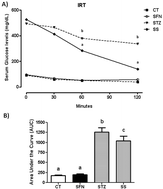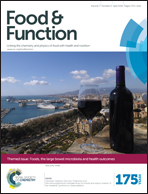Sulforaphane ameliorates the insulin responsiveness and the lipid profile but does not alter the antioxidant response in diabetic rats
Abstract
Diabetes is one of the most prevalent chronic non-communicable diseases and is characterized by hyperglycemia and increased oxidative stress. These two alterations are also responsible for the main diabetic complications: cardiovascular disease, retinopathy, nephropathy and peripheral neuropathy. Diabetes progression is governed by pancreatic β-cell failure, and recent studies showed that sulforaphane (SFN) might be able to prevent this change, preserving insulin production. Consequently, our goal was to test the effects of SFN on metabolic parameters related to diabetic complications and antioxidant defenses (superoxide dismutase, catalase and sulfhydryl groups) in the pancreas, liver and kidney of non-diabetic and diabetic rats. Male Wistar rats were treated with water or 0.5 mg kg−1 SFN i.p. for 21 days after diabetes induction. In diabetic animals treated with SFN, the serum levels of total cholesterol, non-HDL cholesterol and triacylglycerols were similar to those of non-diabetic animals, and the insulin responsiveness was higher than that of the diabetic animals that did not receive the compound. No effect of SFN on the superoxide dismutase and catalase activity or sulfhydryl groups was observed in the pancreas, liver or kidney of the treated animals. We conclude that SFN ameliorates some features of clinical diabetic complications particularly the lipid profile and insulin responsiveness, but it does not modulate the antioxidant response induced by superoxide dismutase, catalase and sulfhydryl groups in the evaluated organs.


 Please wait while we load your content...
Please wait while we load your content...